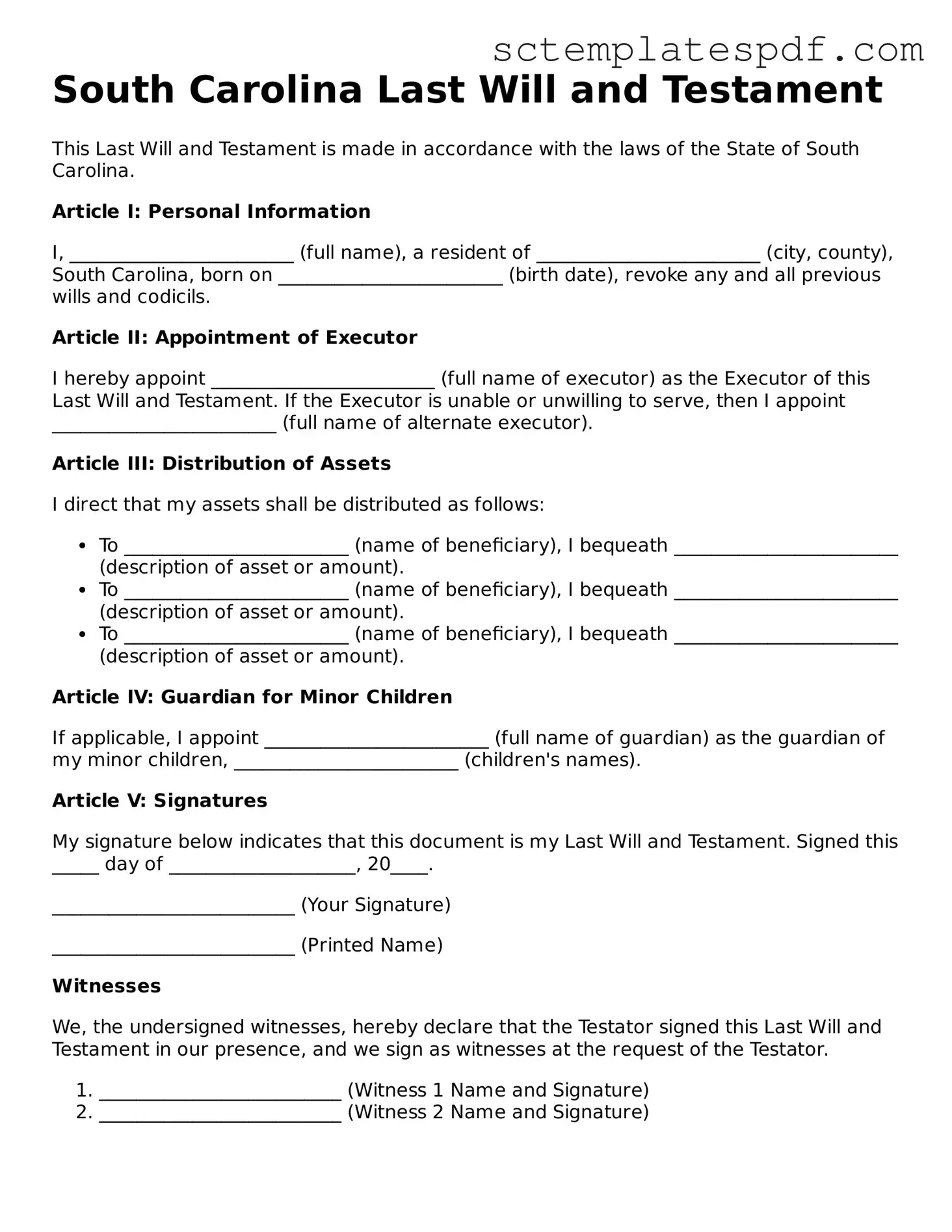Valid South Carolina Last Will and Testament Document
Creating a Last Will and Testament is an essential step for individuals in South Carolina who wish to ensure their wishes regarding asset distribution and guardianship are honored after their passing. This legal document serves as a formal declaration of how a person wants their property and belongings to be managed and distributed. In South Carolina, the Last Will and Testament form includes vital components such as the identification of the testator, the appointment of an executor, and the specification of beneficiaries. Additionally, it may address the care of minor children, ensuring that their future is secured according to the testator's wishes. Proper execution of this form requires adherence to specific state laws, including signing in the presence of witnesses, which adds a layer of validity to the document. Understanding these aspects is crucial for anyone considering preparing a will, as it provides peace of mind and clarity for both the individual and their loved ones.
Key takeaways
When preparing a Last Will and Testament in South Carolina, it’s essential to understand the process and requirements. Here are some key takeaways to keep in mind:
- Clear Identification: Ensure that you clearly identify yourself and your beneficiaries. Include full names and relationships to avoid any confusion.
- Executor Selection: Choose a trustworthy executor who will manage your estate according to your wishes. This person will be responsible for carrying out the instructions in your will.
- Witness Requirements: South Carolina law requires at least two witnesses to sign your will. They must be present at the same time when you sign the document.
- Revocation of Previous Wills: If you have made previous wills, explicitly state that this new will revokes any prior versions. This helps prevent any disputes about your intentions.
- Storage and Accessibility: Store your will in a safe place, but ensure that your executor knows where to find it. Accessibility is crucial for the timely execution of your wishes.
By following these guidelines, you can create a clear and effective Last Will and Testament that reflects your wishes and provides peace of mind for your loved ones.
Dos and Don'ts
When filling out the South Carolina Last Will and Testament form, there are important guidelines to follow. Here are four key dos and don'ts:
- Do ensure that you are of sound mind and at least 18 years old when creating your will.
- Do clearly identify your assets and beneficiaries to avoid confusion.
- Don't use vague language that could lead to misinterpretation of your wishes.
- Don't forget to have your will signed in front of two witnesses who are not beneficiaries.
Guidelines on Utilizing South Carolina Last Will and Testament
Filling out a Last Will and Testament form is an important step in planning for the future. Once you have completed the form, it’s essential to ensure that it is signed, witnessed, and stored safely. This will help ensure that your wishes are honored when the time comes.
- Begin by gathering necessary information about yourself, including your full name, address, and date of birth.
- Clearly state that this document is your Last Will and Testament at the top of the form.
- Identify your beneficiaries. List their full names and relationships to you. Be specific about what each beneficiary will receive.
- Designate an executor. This person will be responsible for carrying out the terms of your will. Include their full name and contact information.
- If you have minor children, appoint a guardian for them. This ensures they will be cared for by someone you trust.
- Include any specific wishes regarding funeral arrangements or the handling of your remains, if desired.
- Review the document carefully for accuracy and completeness. Make sure all information is correct and clearly stated.
- Sign the will in the presence of at least two witnesses. They should also sign the document, acknowledging that they witnessed your signing.
- Store the completed will in a safe place, such as a safe deposit box or with a trusted attorney. Inform your executor and beneficiaries where it can be found.
Other Popular South Carolina Forms
Sc Homeschool Laws - A simple document to inform your school district of your intent to homeschool.
For those looking to sell or purchase a tractor, understanding the process is crucial, and utilizing the Missouri PDF Forms can greatly assist in efficiently handling the necessary paperwork involved in the transaction.
South Carolina Power of Attorney - Allows for flexibility in the child's living arrangements.
Free Printable Golf Cart Bill of Sale - Establishes trust between the seller and buyer through documentation.
